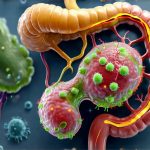Chronic stress is an inescapable part of modern life, woven into the fabric of demanding careers, complex relationships, and ongoing global uncertainties. While often framed as a psychological phenomenon, its effects ripple far beyond mental wellbeing, profoundly influencing our physiological state – particularly the intricate ecosystem within our gut and the body’s defense mechanisms. The relationship between stress, the gut microbiome, and immunity is bidirectional; meaning each component influences the others in a complex feedback loop. Understanding this interplay isn’t simply about recognizing what happens during chronic stress, but appreciating how these changes unfold at a molecular level and why they matter for long-term health.
The gut microbiome, comprising trillions of bacteria, fungi, viruses, and other microorganisms residing in our digestive tract, is increasingly recognized as a central regulator of overall health. It’s involved in everything from nutrient absorption and vitamin synthesis to brain function and immune system development. Chronic stress disrupts this delicate balance, altering the composition and functionality of the gut microbiome in ways that can significantly compromise immune response and increase susceptibility to disease. This isn’t merely about feeling anxious; it’s a fundamental shift in our internal environment with lasting consequences. The body’s attempts to cope with prolonged stress activate various physiological systems – notably the hypothalamic-pituitary-adrenal (HPA) axis and the sympathetic nervous system – which directly and indirectly impact gut function and microbial communities. Understanding gut diagnostics can help you understand this process better.
Stress & Microbiome Dysbiosis: A Complex Interplay
The term dysbiosis refers to an imbalance in the composition of the gut microbiome, characterized by a reduction in beneficial bacteria and/or an overgrowth of potentially harmful ones. Chronic stress is a major driver of dysbiosis. Several mechanisms contribute to this phenomenon. Firstly, stress hormones like cortisol, released during chronic activation of the HPA axis, can directly affect gut permeability – often referred to as “leaky gut.” This increased permeability allows bacterial products, such as lipopolysaccharide (LPS), to leak out of the gut and into the bloodstream, triggering systemic inflammation. Secondly, changes in gut motility – the speed at which food moves through the digestive tract – induced by stress can alter microbial composition. Faster transit times may reduce nutrient absorption and limit the time beneficial bacteria have to colonize, while slower transit times can lead to bacterial overgrowth.
Furthermore, stress impacts the secretion of digestive fluids like stomach acid and bile acids, both crucial for maintaining a healthy gut environment. Reduced acidity favors the growth of certain pathogenic bacteria. Stress also affects dietary habits; individuals under chronic stress are more likely to consume processed foods, sugary drinks, and comfort foods which often lack fiber – essential nourishment for beneficial gut bacteria. This creates a vicious cycle: stress leads to poor diet, which further exacerbates dysbiosis, amplifying the negative effects of stress. Specific microbial shifts observed in response to chronic stress include decreases in Lactobacillus and Bifidobacterium, both known probiotics associated with immune regulation and gut health, and increases in bacteria belonging to the Enterobacteriaceae family, often linked to inflammation. Consider how meal texture can impact this process.
Finally, it’s important to understand that the impact of stress on the microbiome isn’t uniform across individuals. Factors like genetics, pre-existing diet, age, and lifestyle all play a role in determining how susceptible someone is to these changes and the severity of the resulting dysbiosis. The resilience of an individual’s initial microbiome also influences its response to stressors; a more diverse and robust starting point offers greater protection.
The Gut-Immune Axis & Stress-Induced Immunomodulation
The gut microbiome isn’t merely passively affected by stress; it actively communicates with the immune system, forming what is known as the gut-immune axis. This bidirectional communication is essential for maintaining immune homeostasis – a balanced and responsive immune system. A healthy microbiome helps “train” the immune system to distinguish between harmless microbes and potential pathogens, preventing overreactions that can lead to autoimmune diseases or chronic inflammation. Conversely, the immune system regulates microbial composition by selectively promoting beneficial bacteria and suppressing harmful ones. Chronic stress disrupts this carefully orchestrated dialogue.
Stress-induced dysbiosis impairs the development and function of various immune cells. For example, a reduction in Faecalibacterium prausnitzii, often decreased during periods of chronic stress, is associated with reduced production of short-chain fatty acids (SCFAs) – metabolites produced by gut bacteria that have potent anti-inflammatory properties. SCFAs like butyrate are crucial for maintaining the integrity of the gut barrier and modulating immune cell function. Furthermore, stress can suppress the activity of natural killer (NK) cells, which play a vital role in eliminating virus-infected or cancerous cells. It also alters the balance between different types of T helper cells, potentially leading to an impaired ability to fight off infections. Gut inflammation can significantly impact this process.
The consequence is often a state of immune dysregulation – a compromised immune system that’s either overly reactive or suppressed, increasing vulnerability to both infectious diseases and chronic inflammatory conditions. This can manifest as increased susceptibility to colds and flu, exacerbation of autoimmune symptoms, or even an increased risk of developing allergies. The impact isn’t limited to the gut itself; stress-induced changes in the microbiome and immune system can have systemic effects, contributing to conditions like cardiovascular disease, metabolic disorders, and neurodegenerative diseases.
Stress & Inflammatory Bowel Disease (IBD)
Inflammatory bowel disease (IBD), encompassing Crohn’s disease and ulcerative colitis, is characterized by chronic inflammation of the digestive tract. While genetics play a significant role in IBD development, environmental factors – notably stress – are strongly implicated as triggers or exacerbating influences. The link between stress and IBD isn’t straightforward; it’s not simply that stress causes IBD, but rather that it can disrupt the delicate balance within the gut microbiome and immune system, increasing the risk of flare-ups in individuals already predisposed to the condition.
- Stress alters gut permeability, allowing increased antigen exposure which triggers an exaggerated immune response in genetically susceptible individuals.
- Dysbiosis associated with stress contributes to a pro-inflammatory environment in the gut. The reduction in SCFA-producing bacteria weakens the gut barrier and diminishes anti-inflammatory signaling.
- Chronic activation of the HPA axis can lead to impaired cortisol regulation, further exacerbating inflammation.
Studies have shown that individuals experiencing significant life stressors are more likely to experience IBD flare-ups. Moreover, interventions aimed at reducing stress – such as mindfulness training or cognitive behavioral therapy – have been shown to improve symptoms in some IBD patients. However, it’s crucial to remember that managing stress is only one component of IBD management; a comprehensive approach including medication, dietary modifications, and lifestyle changes is typically necessary. Understanding gut acidity can help with this.
The Role of SCFAs & Microbial Metabolites
Short-chain fatty acids (SCFAs) are key mediators in the gut-immune axis and significantly impacted by stress-induced dysbiosis. As mentioned earlier, these metabolites – primarily acetate, propionate, and butyrate – are produced by bacterial fermentation of dietary fiber in the colon. Butyrate is particularly important for colonic health as it serves as the primary energy source for colonocytes (cells lining the colon) and strengthens the gut barrier function.
Stress reduces microbial diversity and the abundance of SCFA-producing bacteria, leading to decreased SCFA production. This has several consequences:
1. Weakened gut barrier integrity increases intestinal permeability and systemic inflammation.
2. Reduced energy supply for colonocytes compromises their ability to repair damage and maintain a healthy mucosal lining.
3. Impaired immune regulation as SCFAs directly influence the function of immune cells, promoting anti-inflammatory responses.
Beyond SCFAs, other microbial metabolites also play crucial roles in modulating immune response. For example, tryptophan metabolites produced by gut bacteria can influence brain function and immune cell activity. Stress alters the production of these metabolites, further contributing to immune dysregulation. Restoring a healthy microbiome through dietary interventions – increasing fiber intake, consuming fermented foods – or targeted probiotic supplementation may help restore SCFA production and improve immune function.
Strategies for Mitigating Stress-Induced Microbiome & Immune Changes
While completely eliminating stress isn’t realistic, there are several strategies to mitigate its impact on the gut microbiome and immune system. A holistic approach that addresses both psychological and physiological aspects of stress is crucial.
- Stress Management Techniques: Practices like mindfulness meditation, yoga, deep breathing exercises, and progressive muscle relaxation can help reduce cortisol levels and promote a sense of calm. Cognitive Behavioral Therapy (CBT) can also be effective in changing negative thought patterns and coping mechanisms.
- Dietary Interventions: Focusing on a diet rich in fiber – fruits, vegetables, whole grains, legumes – provides nourishment for beneficial gut bacteria. Limiting processed foods, sugary drinks, and excessive alcohol consumption is equally important. Fermented foods like yogurt, kefir, sauerkraut, and kimchi introduce probiotics into the gut.
- Lifestyle Modifications: Regular exercise, adequate sleep (7-8 hours per night), and social connection are all essential for managing stress and supporting a healthy microbiome. Prioritizing time for relaxation and hobbies can also help buffer against the negative effects of chronic stress.
- Targeted Supplementation (with professional guidance): Probiotic supplements may be helpful in restoring microbial balance, but it’s crucial to choose strains that are well-researched and appropriate for individual needs. Prebiotic supplements – non-digestible fibers that feed beneficial gut bacteria – can also support microbiome health. It’s vital to consult with a healthcare professional before starting any new supplement regimen.
It’s important to remember that restoring gut health is a gradual process, requiring consistent effort and personalized strategies. Recognizing the intricate link between stress, the gut microbiome, and immunity empowers us to take proactive steps towards improving our overall wellbeing and resilience in the face of life’s challenges. The influence of your gut microbiome is far reaching! Consider how food temperature and meal texture impact your digestion, as well as the connection between gut diagnostics and mental wellbeing. Finally, don’t underestimate how gut inflammation can affect your energy levels.


















